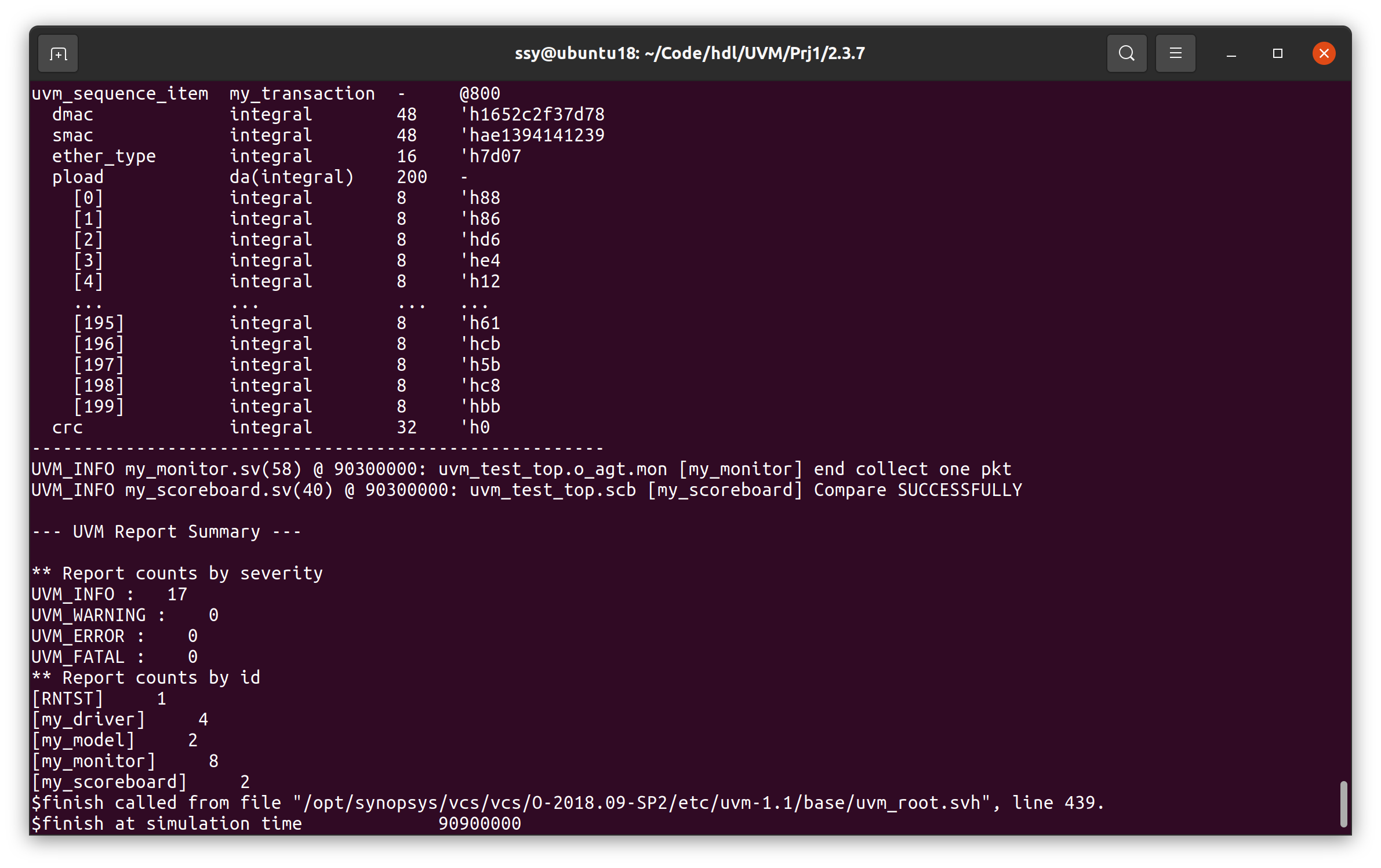本篇文章在已有的基础上,继续给验证平台添加reference model 和scoreboard组件。
https://github.com/shirainbown/UVM-Step-by-Step/tree/master
1. reference model
reference model 用于接收来自monitor的数据,也即DUT 的输入端口的数据,然后模拟DUT 的行为,计算正确的输出结果然后把结果输出给scoreboard。
`ifndef MY_MODEL__SV
`define MY_MODEL__SV
class my_model extends uvm_component;
uvm_blocking_get_port #(my_transaction) port; //获取数据的端口,#中表示这个端口传递的数据类型是my_transaction
uvm_analysis_port #(my_transaction) ap; // 发送数据的端口
extern function new(string name, uvm_component parent);
extern function void build_phase(uvm_phase phase);
extern virtual task main_phase(uvm_phase phase);
`uvm_component_utils(my_model)
endclass
function my_model::new(string name, uvm_component parent);
super.new(name, parent);
endfunction
function void my_model::build_phase(uvm_phase phase);
super.build_phase(phase);
port = new("port", this);
ap = new("ap", this);
endfunction
task my_model::main_phase(uvm_phase phase);
my_transaction tr;
my_transaction new_tr;
super.main_phase(phase);
while(1) begin // 循环执行
port.get(tr);
new_tr = new("new_tr");
new_tr.copy(tr); // 这里是因为DUT 本身就是直接传递数据,所以计算出来的tr其实就是复制一份。
`uvm_info("my_model", "get one transaction, copy and print it:", UVM_LOW)
// new_tr.print(); // 打印信息
ap.write(new_tr);
end
endtask
`endif我们知道,reference model具有一个输入端口和一个输出端口,并且端口的数据类型都是transaction,那么就有两个port,分别是uvm_blocking_get_port和uvm_analysis_port。前者是阻塞式的,会等待一个transaction传进来才会执行其他的动作,而后者则是直接把transaction传出去就不管了,然后继续执行其他的动作。也很好理解,没有trasaction进来那么就没办法去计算对应的输出,只要输出计算完了就可以直接把数据发送出去等待下一个trasaction进来。
这里对port的操作有两种,各种是get,一种是write,分别对应取数据和写数据。
2. scoreboard
Scoreboard 用于 结果验证 和 比较预期值与实际值,以确保设计(DUT,Device Under Test)的行为符合预期。简单来说,Scoreboard 就是一个用于验证 DUT 输出正确性 的 检查和记录器。
`ifndef MY_SCOREBOARD__SV
`define MY_SCOREBOARD__SV
class my_scoreboard extends uvm_scoreboard;
my_transaction expect_queue[$];
uvm_blocking_get_port #(my_transaction) exp_port;
uvm_blocking_get_port #(my_transaction) act_port;
`uvm_component_utils(my_scoreboard)
extern function new(string name, uvm_component parent = null);
extern virtual function void build_phase(uvm_phase phase);
extern virtual task main_phase(uvm_phase phase);
endclass
function my_scoreboard::new(string name, uvm_component parent = null);
super.new(name, parent);
endfunction
function void my_scoreboard::build_phase(uvm_phase phase);
super.build_phase(phase);
exp_port = new("exp_port", this);
act_port = new("act_port", this);
endfunction
task my_scoreboard::main_phase(uvm_phase phase);
my_transaction get_expect, get_actual, tmp_tran;
bit result;
super.main_phase(phase);
fork
while (1) begin
exp_port.get(get_expect);
expect_queue.push_back(get_expect);
end
while (1) begin
act_port.get(get_actual);
if(expect_queue.size() > 0) begin
tmp_tran = expect_queue.pop_front();
result = get_actual.compare(tmp_tran);
if(result) begin
`uvm_info("my_scoreboard", "Compare SUCCESSFULLY", UVM_LOW);
end
else begin
`uvm_error("my_scoreboard", "Compare FAILED");
$display("the expect pkt is");
tmp_tran.print();
$display("the actual pkt is");
get_actual.print();
end
end
else begin
`uvm_error("my_scoreboard", "Received from DUT, while Expect Queue is empty");
$display("the unexpected pkt is");
get_actual.print();
end
end
join
endtask
`endif类似的,scoreboard也需要有两个端口,一个来源与reference model,一个来源于DUT 输出端口的monitor,分别对应exp_port,和act_port。
socreboard执行两个任务,一个是不停的接收reference model的数据,另一个是不停接收monitor的数据,对照代码我们可以看到一些不同,即第二个while循环认定act_port能够get到数据时,expect_queue一定不会是空的。这个很好理解,DUT 和reference model 都是同时得到driver处的数据,但是DUT处理是需要依赖clock的,而reference model 是没有时钟的,立刻计算出正确数据。
3. 修改transaction的代码
在上两个模块中,我们直接使用了print、compare等函数,这些我们并没有定义,为什么能够直接使用呢?这是因为我们对transaction进行了注册,之前的注册方式`uvm_object_utils 并不能告诉平台,print的时候要输出哪些数据,所以我们还需要进行修改。
`ifndef MY_TRANSACTION__SV
`define MY_TRANSACTION__SV
class my_transaction extends uvm_sequence_item;
rand bit[47:0] dmac;
rand bit[47:0] smac;
rand bit[15:0] ether_type;
rand byte pload[];
rand bit[31:0] crc;
constraint pload_cons{
pload.size >= 46;
pload.size <= 1500;
}
function bit[31:0] calc_crc();
return 32'h0;
endfunction
function void post_randomize();
crc = calc_crc;
endfunction
`uvm_object_utils_begin(my_transaction) \\ 注册以下几个成员变量
`uvm_field_int(dmac, UVM_ALL_ON)
`uvm_field_int(smac, UVM_ALL_ON)
`uvm_field_int(ether_type, UVM_ALL_ON)
`uvm_field_array_int(pload, UVM_ALL_ON)
`uvm_field_int(crc, UVM_ALL_ON)
`uvm_object_utils_end
function new(string name = "my_transaction");
super.new();
endfunction
endclass
`endif4. 在monitor中添加端口
我们在RM 和SB 中添加了端口,那么还需要对应着添加monitor中的发送端口,类似的,我们可以得到;
`ifndef MY_MONITOR__SV
`define MY_MONITOR__SV
class my_monitor extends uvm_monitor;
virtual my_if vif;
uvm_analysis_port #(my_transaction) ap;
`uvm_component_utils(my_monitor)
function new(string name = "my_monitor", uvm_component parent = null);
super.new(name, parent);
endfunction
virtual function void build_phase(uvm_phase phase);
super.build_phase(phase);
if(!uvm_config_db#(virtual my_if)::get(this, "", "vif", vif))
`uvm_fatal("my_monitor", "virtual interface must be set for vif!!!")
ap = new("ap", this);
endfunction
extern task main_phase(uvm_phase phase);
extern task collect_one_pkt(my_transaction tr);
endclass
task my_monitor::main_phase(uvm_phase phase);
my_transaction tr;
while(1) begin
tr = new("tr");
collect_one_pkt(tr);
ap.write(tr);
end
endtask
task my_monitor::collect_one_pkt(my_transaction tr); // 这里的函数实现修改了,但是无需在意,只是利用了transaction 注册后的一些特性
byte unsigned data_q[$];
byte unsigned data_array[];
logic [7:0] data;
logic valid = 0;
int data_size;
while(1) begin
@(posedge vif.clk);
if(vif.valid) break;
end
`uvm_info("my_monitor", "begin to collect one pkt", UVM_LOW);
while(vif.valid) begin
data_q.push_back(vif.data);
@(posedge vif.clk);
end
data_size = data_q.size();
data_array = new[data_size];
for ( int i = 0; i < data_size; i++ ) begin
data_array[i] = data_q[i];
end
tr.pload = new[data_size - 18]; //da sa, e_type, crc
data_size = tr.unpack_bytes(data_array) / 8;
`uvm_info("my_monitor", "end collect one pkt", UVM_LOW);
endtask
`endif`ifndef MY_AGENT__SV
`define MY_AGENT__SV
class my_agent extends uvm_agent ;
my_driver drv;
my_monitor mon;
uvm_analysis_port #(my_transaction) ap;
function new(string name, uvm_component parent);
super.new(name, parent);
endfunction
extern virtual function void build_phase(uvm_phase phase);
extern virtual function void connect_phase(uvm_phase phase);
`uvm_component_utils(my_agent)
endclass
function void my_agent::build_phase(uvm_phase phase);
super.build_phase(phase);
if (is_active == UVM_ACTIVE) begin
drv = my_driver::type_id::create("drv", this);
end
mon = my_monitor::type_id::create("mon", this);
endfunction
function void my_agent::connect_phase(uvm_phase phase);
super.connect_phase(phase);
ap = mon.ap;
endfunction
`endif除了在monitor中定义,我们还需要在agent里面定义,这是然后将agent中的ap的指针指向monitor的port,这样做的目的就是避免层次结构混乱,对monitor的操作都可以在agent中进行。
5. 在env中连接端口
`ifndef MY_ENV__SV
`define MY_ENV__SV
class my_env extends uvm_env;
my_agent i_agt;
my_agent o_agt;
my_model mdl;
my_scoreboard scb;
uvm_tlm_analysis_fifo #(my_transaction) agt_scb_fifo; // #表示fifo中存储单元是my_transaction
uvm_tlm_analysis_fifo #(my_transaction) agt_mdl_fifo;
uvm_tlm_analysis_fifo #(my_transaction) mdl_scb_fifo;
function new(string name = "my_env", uvm_component parent);
super.new(name, parent);
endfunction
virtual function void build_phase(uvm_phase phase);
super.build_phase(phase);
i_agt = my_agent::type_id::create("i_agt", this);
o_agt = my_agent::type_id::create("o_agt", this);
i_agt.is_active = UVM_ACTIVE;
o_agt.is_active = UVM_PASSIVE;
mdl = my_model::type_id::create("mdl", this);
scb = my_scoreboard::type_id::create("scb", this);
agt_scb_fifo = new("agt_scb_fifo", this);
agt_mdl_fifo = new("agt_mdl_fifo", this);
mdl_scb_fifo = new("mdl_scb_fifo", this);
endfunction
extern virtual function void connect_phase(uvm_phase phase);
`uvm_component_utils(my_env)
endclass
function void my_env::connect_phase(uvm_phase phase);
super.connect_phase(phase);
i_agt.ap.connect(agt_mdl_fifo.analysis_export);
mdl.port.connect(agt_mdl_fifo.blocking_get_export);
mdl.ap.connect(mdl_scb_fifo.analysis_export);
scb.exp_port.connect(mdl_scb_fifo.blocking_get_export);
o_agt.ap.connect(agt_scb_fifo.analysis_export);
scb.act_port.connect(agt_scb_fifo.blocking_get_export);
endfunction
`endif这里我们定义了三个fifo,fifo的两个端口也需要分别与我们在组件中定义的端口相连,定义的是阻塞就连阻塞,定义的是非阻塞就连非阻塞。
至此,我们可以运行程序,下面补上driver和tb_top的内容:
`ifndef MY_DRIVER__SV
`define MY_DRIVER__SV
class my_driver extends uvm_driver;
virtual my_if vif;
`uvm_component_utils(my_driver)
function new(string name = "my_driver", uvm_component parent = null);
super.new(name, parent);
endfunction
virtual function void build_phase(uvm_phase phase);
super.build_phase(phase);
if(!uvm_config_db#(virtual my_if)::get(this, "", "vif", vif))
`uvm_fatal("my_driver", "virtual interface must be set for vif!!!")
endfunction
extern task main_phase(uvm_phase phase);
extern task drive_one_pkt(my_transaction tr);
endclass
task my_driver::main_phase(uvm_phase phase);
my_transaction tr;
phase.raise_objection(this);
vif.data <= 8'b0;
vif.valid <= 1'b0;
while(!vif.rst_n)
@(posedge vif.clk);
for(int i = 0; i < 2; i++) begin
tr = new("tr");
assert(tr.randomize() with {pload.size == 200;});
drive_one_pkt(tr);
end
repeat(5) @(posedge vif.clk);
phase.drop_objection(this);
endtask
task my_driver::drive_one_pkt(my_transaction tr);
byte unsigned data_q[];
int data_size;
data_size = tr.pack_bytes(data_q) / 8;
`uvm_info("my_driver", "begin to drive one pkt", UVM_LOW);
repeat(3) @(posedge vif.clk);
for ( int i = 0; i < data_size; i++ ) begin
@(posedge vif.clk);
vif.valid <= 1'b1;
vif.data <= data_q[i];
end
@(posedge vif.clk);
vif.valid <= 1'b0;
`uvm_info("my_driver", "end drive one pkt", UVM_LOW);
endtask
`endif`timescale 1ns/1ps
`include "uvm_macros.svh"
import uvm_pkg::*;
`include "my_if.sv"
`include "my_transaction.sv"
`include "my_driver.sv"
`include "my_monitor.sv"
`include "my_agent.sv"
`include "my_model.sv"
`include "my_scoreboard.sv"
`include "my_env.sv"
module top_tb;
reg clk;
reg rst_n;
reg[7:0] rxd;
reg rx_dv;
wire[7:0] txd;
wire tx_en;
my_if input_if(clk, rst_n);
my_if output_if(clk, rst_n);
dut my_dut(.clk(clk),
.rst_n(rst_n),
.rxd(input_if.data),
.rx_dv(input_if.valid),
.txd(output_if.data),
.tx_en(output_if.valid));
initial begin
clk = 0;
forever begin
#100 clk = ~clk;
end
end
initial begin
rst_n = 1'b0;
#1000;
rst_n = 1'b1;
end
initial begin
run_test("my_env");
end
initial begin
uvm_config_db#(virtual my_if)::set(null, "uvm_test_top.i_agt.drv", "vif", input_if);
uvm_config_db#(virtual my_if)::set(null, "uvm_test_top.i_agt.mon", "vif", input_if);
uvm_config_db#(virtual my_if)::set(null, "uvm_test_top.o_agt.mon", "vif", output_if);
end
endmodule更新以下filelist.f:
+incdir+$UVM_HOME/src
$UVM_HOME/src/uvm_pkg.sv
../dut/dut.sv
top_tb.sv
my_driver.sv
my_if.sv
my_transaction.sv
my_monitor.sv
my_agent.sv
my_env.sv
my_scoreboard.sv
my_model.sv文件树如下:
├── 2.3.7
│ ├── filelist.f
│ ├── Makefile
│ ├── my_agent.sv
│ ├── my_driver.sv
│ ├── my_env.sv
│ ├── my_if.sv
│ ├── my_model.sv
│ ├── my_monitor.sv
│ ├── my_scoreboard.sv
│ ├── my_transaction.sv
│ └── top_tb.sv
└── dut
└── dut.sv执行得到:



评论